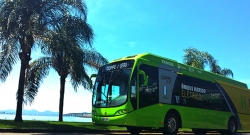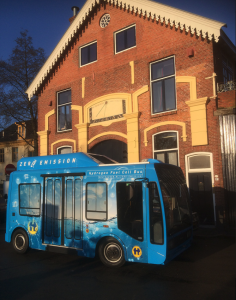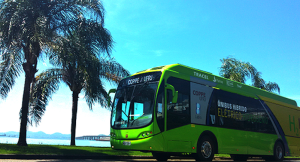Horizon’s Air-Cooled Fuel Cells Power Electric Buses Around the World
Horizon Fuel Cell Technologies is changing the game in Fuel Cell range extenders for electric vehicles. Typically air-cooled Fuel Cell stacks weren't suitable for such applications, but all that changes with Horizon's latest developments. This makes systems simpler and cheaper for integrators and builders of electric vehicles.

Singapore, Singapore, February 07, 2017 --(PR.com)-- Horizon Fuel Cell Technologies (Horizon) has provided a Fuel Cell range-extender solution for a Dutch company demonstrating the potential for hydrogen in clean transport in northern Europe, just months after powering fuel cell buses for the 2016 Rio Olympics in Brazil.
Seeking a practical, cost-effective Fuel Cell for their hydrogen demonstrator, Holthausen Waterstof-Centrum chose to work with Horizon on their “hydrogen bus” project.
Holthausen Waterstof-Centrum have also integrated fuel cells into canal tour boats in the northern Netherlands, bringing a strong element of sustainability to the historic canal boats. The Holthausen family are avid believers in hydrogen, and have been close observers of Horizon’s activities in fuel cell stacks.
Unlike typical liquid-cooled automotive fuel cells, Horizon’s air-cooled, high power-density fuel cell systems require no compressor, no humidifier, no hydrogen recirculation pump, and no water coolant loop, drastically simplifying system design and reducing peripheral power loss by 70%. The major benefit of the unique Horizon approach is improved hydrogen fuel efficiency for the vehicle, usually by around 10%.
Air-cooled fuel cells were only suitable for low-power applications in the past due to the challenges in heat dissipation and heat management using air as coolant. The latest developments at Horizon make this accepted wisdom a thing of the past. In recent years, Horizon scientists and engineers have developed propriety technologies to remove the glass ceiling on air-cooled PEM stack power limits, changing the game by providing simpler, more cost-effective Fuel Cell based power capable of serving higher power needs.
Horizon has already delivered systems reaching 60kW with multiple modules, sufficient for most automotive applications. As Horizon increases the power of each Fuel Cell module, much higher power systems are within easy reach, keeping the balance-of-plant designs simple and costs low.
During 2016, Horizon supplied fuel cell systems to the progressive technical university COPPE UFRJ in Rio de Janeiro, which had worked for several years on a hydrogen transport initiative. The Rio Olympics provided the perfect environment to showcase the Hydrogen Fuel Cell Bus designed and integrated by COPPE UFRJ. Athletes enjoyed the comfortable ride in the state-of-the-art Fuel Cell bus, without any of the usual pollution from conventional buses.
Horizon is a seasoned pioneer, commercialising fuel cells in several other areas such as unmanned aerial vehicles (UAV), portable personal power, OEM fuel cell stacks/systems, along with research and education. One of the recent focus areas has been diesel generator replacement for critical infrastructure backup and off-grid power generation. Horizon’s MFC (methanol fuel cell) products, with power from 100W to 10KW, can operate on a blend of methanol and water, offering lower cost and cleaner electrical power to end users. There is a fair chance that your cell phone signal is carried seamlessly through power outages with the help of this type of fuel cell systems, especially in South-East Asia, where power grids frequently struggle to keep up with the demands placed upon them.
About Horizon Fuel Cell Technologies:
Horizon is a world leader in PEM fuel cell systems, and in recent years coupled methanol reformer technology with its PEMFC platform to deliver highly reliable, cost-effective temporary and backup power systems.
Horizon has also delivered 3-60KW fuel cell solutions for buses, trucks and passenger cars to customers around the globe.
Visit www.horizonfuelcell.com or contact Craig Knight craig@horizonfuelcell.com
Seeking a practical, cost-effective Fuel Cell for their hydrogen demonstrator, Holthausen Waterstof-Centrum chose to work with Horizon on their “hydrogen bus” project.
Holthausen Waterstof-Centrum have also integrated fuel cells into canal tour boats in the northern Netherlands, bringing a strong element of sustainability to the historic canal boats. The Holthausen family are avid believers in hydrogen, and have been close observers of Horizon’s activities in fuel cell stacks.
Unlike typical liquid-cooled automotive fuel cells, Horizon’s air-cooled, high power-density fuel cell systems require no compressor, no humidifier, no hydrogen recirculation pump, and no water coolant loop, drastically simplifying system design and reducing peripheral power loss by 70%. The major benefit of the unique Horizon approach is improved hydrogen fuel efficiency for the vehicle, usually by around 10%.
Air-cooled fuel cells were only suitable for low-power applications in the past due to the challenges in heat dissipation and heat management using air as coolant. The latest developments at Horizon make this accepted wisdom a thing of the past. In recent years, Horizon scientists and engineers have developed propriety technologies to remove the glass ceiling on air-cooled PEM stack power limits, changing the game by providing simpler, more cost-effective Fuel Cell based power capable of serving higher power needs.
Horizon has already delivered systems reaching 60kW with multiple modules, sufficient for most automotive applications. As Horizon increases the power of each Fuel Cell module, much higher power systems are within easy reach, keeping the balance-of-plant designs simple and costs low.
During 2016, Horizon supplied fuel cell systems to the progressive technical university COPPE UFRJ in Rio de Janeiro, which had worked for several years on a hydrogen transport initiative. The Rio Olympics provided the perfect environment to showcase the Hydrogen Fuel Cell Bus designed and integrated by COPPE UFRJ. Athletes enjoyed the comfortable ride in the state-of-the-art Fuel Cell bus, without any of the usual pollution from conventional buses.
Horizon is a seasoned pioneer, commercialising fuel cells in several other areas such as unmanned aerial vehicles (UAV), portable personal power, OEM fuel cell stacks/systems, along with research and education. One of the recent focus areas has been diesel generator replacement for critical infrastructure backup and off-grid power generation. Horizon’s MFC (methanol fuel cell) products, with power from 100W to 10KW, can operate on a blend of methanol and water, offering lower cost and cleaner electrical power to end users. There is a fair chance that your cell phone signal is carried seamlessly through power outages with the help of this type of fuel cell systems, especially in South-East Asia, where power grids frequently struggle to keep up with the demands placed upon them.
About Horizon Fuel Cell Technologies:
Horizon is a world leader in PEM fuel cell systems, and in recent years coupled methanol reformer technology with its PEMFC platform to deliver highly reliable, cost-effective temporary and backup power systems.
Horizon has also delivered 3-60KW fuel cell solutions for buses, trucks and passenger cars to customers around the globe.
Visit www.horizonfuelcell.com or contact Craig Knight craig@horizonfuelcell.com
Contact
Horizon Fuel Cell Technologies
Craig Knight
+61422469226
www.horizonfuelcell.com
Craig Knight
+61422469226
www.horizonfuelcell.com
Multimedia

Dutch Hydrogen Bus
Clean and quiet city transport in The Netherlands

Hydrogen FC Bus in Rio
Clean transport for athletes during the 2016 Summer Olympics in Rio de Janeiro, Brazil
Categories
